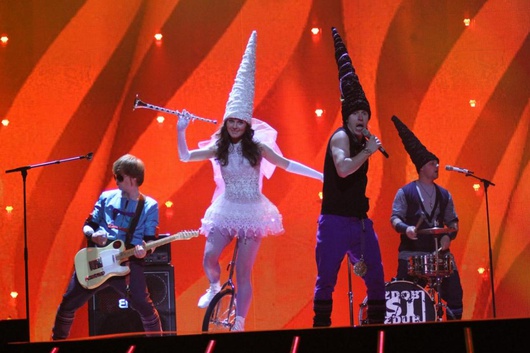
Eurovision 2014: We might not want to win at Copenhagen but we might as well have a decent song
Published on
Britain has not done so well in the Eurovision Song Contest, but could a new approach be what's needed?
With economic woes showing no signs of disappearing, in recent years the possibility of winning the Eurovision song contest has seemed like a poison chalice. As much as winning and hosting the annual song contest is a fun occasion and a chance for the host nation to drum up publicity through cleverly placed inserts of beautiful landscapes and happy people in the national dress, the costs of hosting such an event during times of austerity might not leave everyone happy. Britain has famously done not so well over recent years, with such entrants as Scooch (who took kitsch to a new level) and Andy Abraham languishing at the bottom of the results table.
 Then it seemed that Britain was taking the competition seriously with Andrew Lloyd Webber’s national competition to find an entry in 2010. However, after some good entries not quite reaching the top of the board, Britain decided to field some tried and tested artists in the form of Engelbert Humperdink and Bonnie Tyler. Now tried and tested is good and Eurovision loves kitsch, but while other countries such as Germany and Denmark were fielding young and passionate singers we were offering nothing new, neither in artist or content. However, now this looks set to change. The BBC has announced 2014’s entry to Eurovision, and it's newcomer Molly Smitten-Downes.
Then it seemed that Britain was taking the competition seriously with Andrew Lloyd Webber’s national competition to find an entry in 2010. However, after some good entries not quite reaching the top of the board, Britain decided to field some tried and tested artists in the form of Engelbert Humperdink and Bonnie Tyler. Now tried and tested is good and Eurovision loves kitsch, but while other countries such as Germany and Denmark were fielding young and passionate singers we were offering nothing new, neither in artist or content. However, now this looks set to change. The BBC has announced 2014’s entry to Eurovision, and it's newcomer Molly Smitten-Downes.
 The 26 year old won best song at the Best of British Unsigned Music awards last year and entered the BBC’s portal for undiscovered talent, BBC Introducing, with her song Strange Alien. If she is the chosen entry, this represents a good move for Britain and Eurovision. While we are gloomily resigned to the fact we might not win (often sighted by the political voting that exists in the competition, highlighted by long term commentator Terry Wogan, but it could just be that other entries were better), we might as well field a decent song for the music sake. While some countries go overboard on the costumes and glitter, other countries such as Germany have seen a good opportunity to find young talent and creative song writing. Eurovision might not be a high brow forum for contemporary music, but if we can continue to introduce new candidates then at least we can give them the publicity they deserve and keep Britain on the map of creative song writing. And after all that, we might, just possibly, even do quite well.
The 26 year old won best song at the Best of British Unsigned Music awards last year and entered the BBC’s portal for undiscovered talent, BBC Introducing, with her song Strange Alien. If she is the chosen entry, this represents a good move for Britain and Eurovision. While we are gloomily resigned to the fact we might not win (often sighted by the political voting that exists in the competition, highlighted by long term commentator Terry Wogan, but it could just be that other entries were better), we might as well field a decent song for the music sake. While some countries go overboard on the costumes and glitter, other countries such as Germany have seen a good opportunity to find young talent and creative song writing. Eurovision might not be a high brow forum for contemporary music, but if we can continue to introduce new candidates then at least we can give them the publicity they deserve and keep Britain on the map of creative song writing. And after all that, we might, just possibly, even do quite well.



